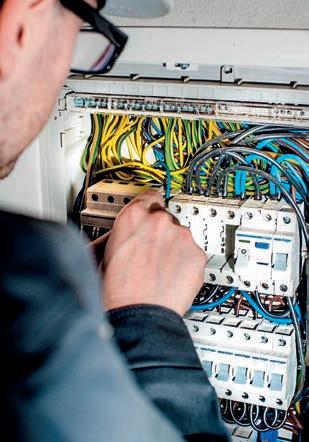
3 minute read
How antimicrobial sockets and switches can help to limit the spread of viruses
from ECN March 2021
Alex Baker, head of operations at electrical wholesaler ERF, discusses the different types of antimicrobial products which are available on the market and how they help to stop the build-up of bacteria and viruses.
Consumer knowledge of antimicrobial products within the domestic market is relatively limited A s the COVID-19 vaccination continues to be rolled out over the coming months, it will be easy for people to start becoming lax about the threat that coronavirus poses to us all.
Advertisement
However, there is no doubt that totally eradicating the virus is going to be extremely difficult, which is why reducing the spread of all diseases, infections and viruses must continue to be a priority in 2021.
While maintaining good hand hygiene will always be of great importance, there are other methods we can all adopt to play our part in keeping everybody safe.
One slightly lesser known but extremely effective way of doing this is to invest in antimicrobial products – which prevent viruses and bacteria building up on commonly touched surfaces, including light switches and sockets.
When we entered the first lockdown in March, there was a 203% surge in people searching for ‘antimicrobial products’, compared to the month before, and while searches have steadily dropped off over the last few months, the demand for these products remains high.
Antimicrobial products kill or slow the spread of viruses, diseases and bacteria. They work at a cellular level to continually disrupt and prevent the growth of microorganisms. By creating an inhospitable environment for bacteria and viruses, antimicrobials form a protection around surfaces people regularly touch.

Antimicrobial products kill or slow the spread of viruses, diseases and bacteria
Reducing the spread of viruses
At a time when infection control must be a priority in all settings, antimicrobial products are an extremely effective way of reducing the risk of virus transmission. While it is not yet fully known how successfully antimicrobial products can kill coronavirus, what is apparent is that they will certainly help to reduce the spread of a whole host of other bacteria and viruses. For example, kill rates of 99.9% have been achieved across four types of the strains of bacteria MRSA, E-Coli, Salmonella, Klebsiella, Pneumonia and enveloped viruses, offering a high protection level to those who touch the surface.
Being two of the most commonly touched surfaces, it is unsurprising that antimicrobial sockets and switches are extremely popular. They are made from treated plastic that contains silver ions which act as a barrier, stopping microorganisms from growing and spreading. While in most antimicrobial products the protection is offered as an additional coating over the original materials, in switches and sockets this is inbuilt. As a result, antimicrobial switches and sockets reduce transmission from humans, animals and insects.
As technology around these products has developed in recent years, a number of manufacturers now offer antimicrobial sockets and switches which come with additional child safety features. By adding an extra layer of protection, these materials ensure the developing immune systems of children are exposed to as few threatening viruses and bacteria as possible. The shuttered sockets and covered plates also provide extra safety from hazards like shocks and electrocutions.
The importance of these products
While the awareness and use of these types of products is there within the hospitality and catering industries, consumer knowledge within the domestic market is relatively limited. It is therefore critical that suppliers of antimicrobial products continue to emphasise their effectiveness in tackling the spread of viruses. If you could choose between an electrical wiring accessory which helped to fight against viruses and bacteria and one which did not, it would seem like the most sensible option to pick the one with the increased protection. For us, it’s similar to choosing between a car with an airbag and one without.
It is however important to stress good hand hygiene and social distancing will remain of critical importance in the months ahead. The effectiveness of face masks and hand sanitiser shouldn’t be underestimated either as we all transition to a new normal and embrace the ongoing battle against coronavirus.










